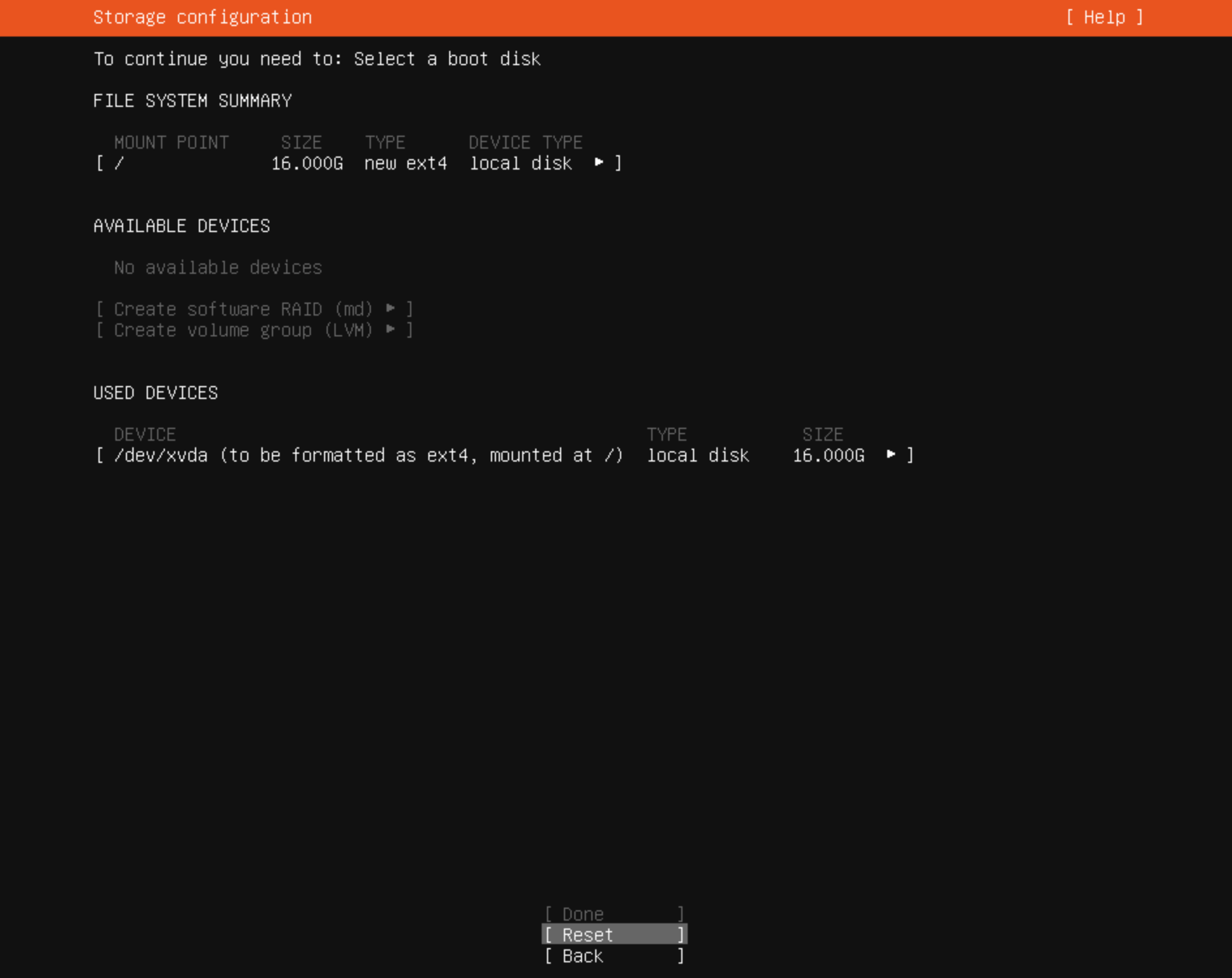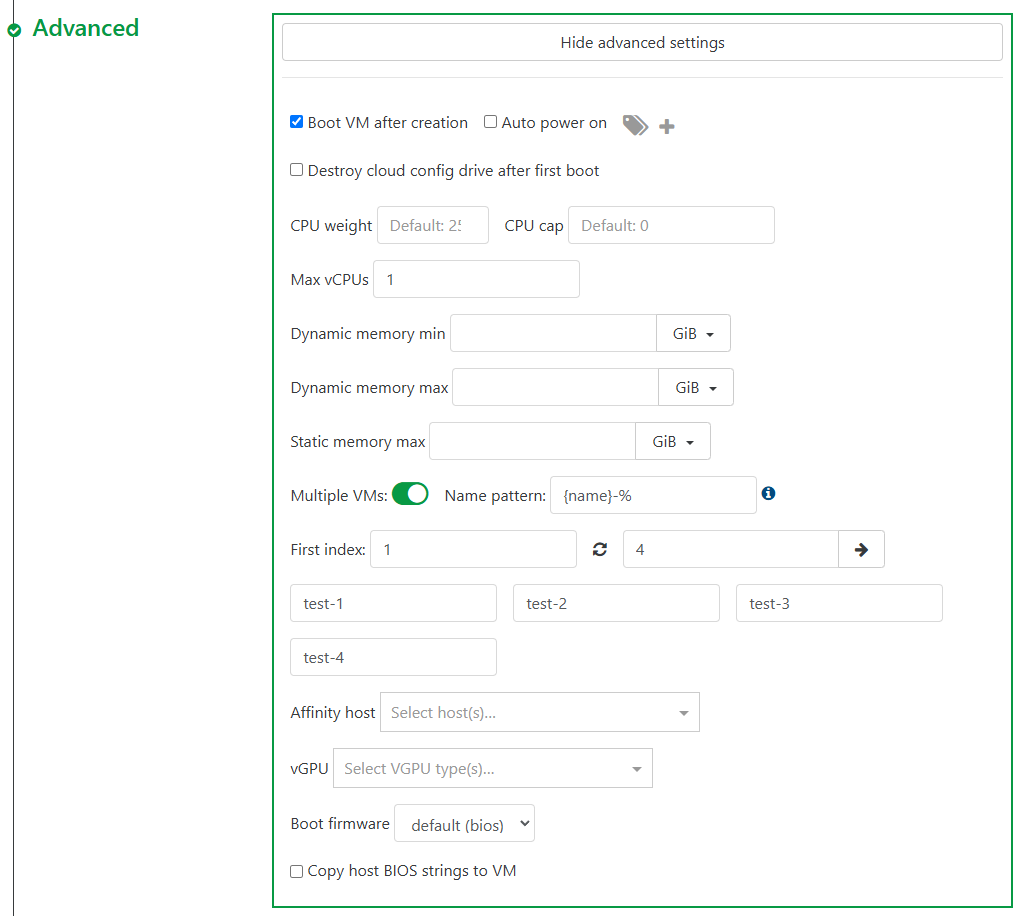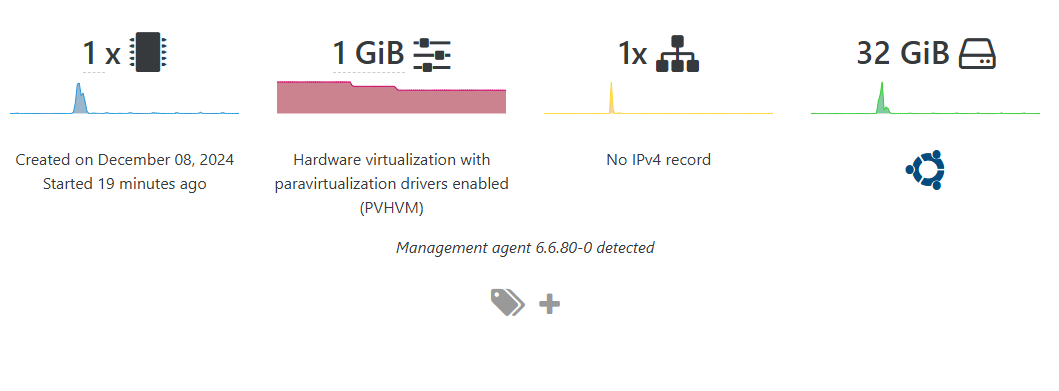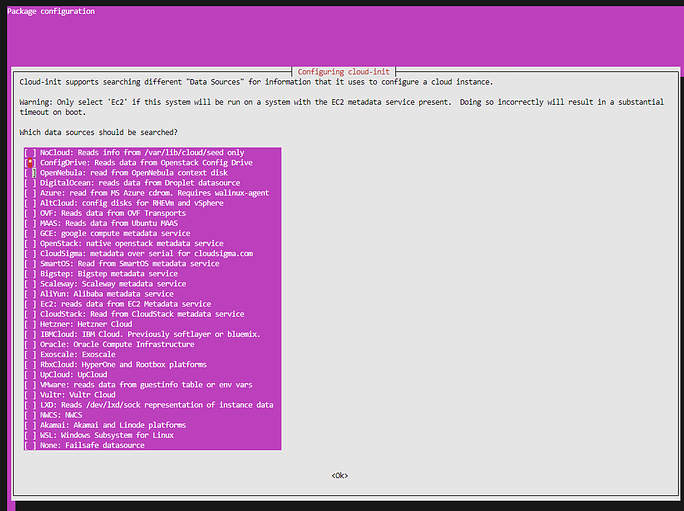fixed!
issue was virtualization was not enabled in BIOS settings
logs on XOA was not good enough
xcp-ng center gave me a better error log message of HVM is Required for this Operation
thanks!
fixed!
issue was virtualization was not enabled in BIOS settings
logs on XOA was not good enough
xcp-ng center gave me a better error log message of HVM is Required for this Operation
thanks!
yeah was able to get ther networking working fine using the v1 also
thanks
am all good now, only other thing which am not really interested in as i prefer to create each VM one a time even if i need multiple
https://xcp-ng.org/forum/topic/10089/dynamic-cloudinit-network-config-feature-request
where do i put the downloaded cloud image to use as template in xen-orchestra?
jammy-server-cloudimg-amd64.ova
creating custom partition on Ubuntu has become rocket science
i am unable to use whole disc as needed for the cloud image
"done" is greyed out and am not sure what config i need to have to use whole disk and be able to move to next step
can you please help?

In the past we had this great tutorial to create cloud images to use with xen-orchestra
https://xen-orchestra.com/blog/centos-cloud-template-for-xenserver/
ANy updated tutorial or guide anywhere to create cloud images for the newer OSes like Ubuntu 22.04 lts etc?
Thanks
from my screenshot it shows duplicate for same pool, so it snot like because multiple pool sor hosts
@dj423 really cool
for now i decided to create one at a time
but when i get some will look into what you have above
thanks again!!!
yeah was able to get ther networking working fine using the v1 also
thanks
am all good now, only other thing which am not really interested in as i prefer to create each VM one a time even if i need multiple
https://xcp-ng.org/forum/topic/10089/dynamic-cloudinit-network-config-feature-request
We can create multiple VMs from cloud image template by dynamically setting hostnames
BUT how do we also apply setting synamic IP addresses to these VMs???
so that way can have something like this
test-1 -> static ipv4 192.168.1.5
test-2 -> static ipv4 192.168.1.6
test-3 -> static ipv4 192.168.1.7
in xen-orchestra we only can apply dynamic hostnames, but we can not apply dynamic static ip

so i imported a new VM and made sure i mounted the guest-tools iso to it before converting it to template
i just tried this and it worked!!!
#cloud-config
hostname: someotheruser
ssh_authorized_keys:
- ssh-rsa AAAAxxx
- ssh-rsa AAAAxxx
- ssh-ed25519 AAAAxxx
runcmd:
- [mkdir, -p, /mnt/guest-tools]
- [mount, /dev/cdrom, /mnt/guest-tools]
- [bash, /mnt/guest-tools/Linux/install.sh]
- [umount, /dev/cdrom]
- [rm, -rf, /mnt/guest-tools]
just seeing your response now as i was trying to post new update
so i imported a new VM and made sure i mounted the guest-tools iso to it before converting it to template
i just tried this and it worked!!!
#cloud-config
hostname: someotheruser
ssh_authorized_keys:
- ssh-rsa AAAAxxx
- ssh-rsa AAAAxxx
- ssh-ed25519 AAAAxxx
runcmd:
- [mkdir, -p, /mnt/guest-tools]
- [mount, /dev/cdrom, /mnt/guest-tools]
- [bash, /mnt/guest-tools/Linux/install.sh]
- [umount, /dev/cdrom]
- [rm, -rf, /mnt/guest-tools]
thanks for all your help, i think am good now!!!
i tried to install guest tools via apt because it is easier when working with cloud images so we can install it in cloudinit
but when i did, it is showing older versions 7.20.2 from the installation output below
root@test-1:~# apt install xe-guest-utilities
Reading package lists... Done
Building dependency tree... Done
Reading state information... Done
The following NEW packages will be installed:
xe-guest-utilities
0 upgraded, 1 newly installed, 0 to remove and 0 not upgraded.
Need to get 765 kB of archives.
After this operation, 1979 kB of additional disk space will be used.
Get:1 http://archive.ubuntu.com/ubuntu noble/universe amd64 xe-guest-utilities amd64 7.20.2-0ubuntu1 [765 kB]
Fetched 765 kB in 1s (834 kB/s)
Selecting previously unselected package xe-guest-utilities.
(Reading database ... 74727 files and directories currently installed.)
Preparing to unpack .../xe-guest-utilities_7.20.2-0ubuntu1_amd64.deb ...
Unpacking xe-guest-utilities (7.20.2-0ubuntu1) ...
Setting up xe-guest-utilities (7.20.2-0ubuntu1) ...
Created symlink /etc/systemd/system/multi-user.target.wants/xe-daemon.service → /usr/lib/systemd/system/xe-daemon.service.
Scanning processes...
Scanning linux images...
but when i check it in xen-orchestra the version showed is different and IP still not even showing

if i installed using the guest-tools iso the latest version 7.30.0-12 is installed
for XCP-ng version v8.2

so can someone please explain to me how we can install same version used with the guest tools iso 7.30.0-12?
ok i got the cloud configs to work now and i can ssh in fine
one last thing i want to know is how do i add the guest tools to the cloud image?
did you mount the guest tools cdrom to the cloud image before you created a template from it?
can you share how you can add guest tools to the VM created from the cloud template at bootup?
thanks
here is cloud config that works
#cloud-config
hostname: someotheruser
ssh_authorized_keys:
- ssh-rsa AAAAxxx
- ssh-rsa AAAAxxx
- ssh-ed25519 AAAAxxx
so how do i add installing guest tools?
when i tried to install via apt, here is what happened
https://xcp-ng.org/forum/topic/10088/how-to-install-guest-tools-via-apt
one issue with the cloud images is that one cant setup the guestools on them baked into the image
that is issue
so every VM i create i have to install the guest tools on all of them
all good though since its pretty quick setup but would be great to have them install at bootstrap
or cna one install it with the cloud config? that might be possible actually but never tried that
i will try using the cloud images as base now
what i used originally was the regular ISO here
and i used this one for 24.04 lts
i pretty much followed the guide i mentioned
after i have the Ubuntu OS installed
i made sure to use ubuntu as user
i sshed in, sudo to root user and ran the following commands
ubuntu@ubuntu:~$ sudo -i
[sudo] password for ubuntu:
root@ubuntu:~#
root@ubuntu:~# mount /dev/cdrom /mnt
root@ubuntu:~# bash /mnt/Linux/install.sh
root@ubuntu:~# umount /dev/cdrom
root@ubuntu:~# apt install -y cloud-init cloud-initramfs-growroot
then went to /etc/cloud/cloud.cfg but i did not have anything to change as i am ok with the defaults
then
root@alien:~# dpkg-reconfigure cloud-init
and made sure to only have the ConfigDrive checked
 

then ran this command next
passwd -l root
shut down the VM and converted to template
and here are my cloud init settings when creating a VM from the template
cloud config
#cloud-config
hostname: someotheruser
ssh_authorized_keys:
- ssh-rsa AAAAxxx
- ssh-rsa AAAAxxx
- ssh-ed25519 AAAAxxx
network config
network:
version: 2
ethernets:
eth0:
dhcp4: false
#dhcp6: false
addresses:
- 10.1.1.10/24
#- 4612:::/72
gateway4: 10.1.1.1
#gateway6: 4612:::0
nameservers:
addresses:
- 1.1.1.1
- 8.8.8.8
#- 2606:4700:4700::1111
#- 2001:4860:4860::8888
when i create a VM from the template, it does not create the user from my cloud config and nothing from my network config
instead it boots up with original ip of the VM before i create d a template form it, meaning it does not work